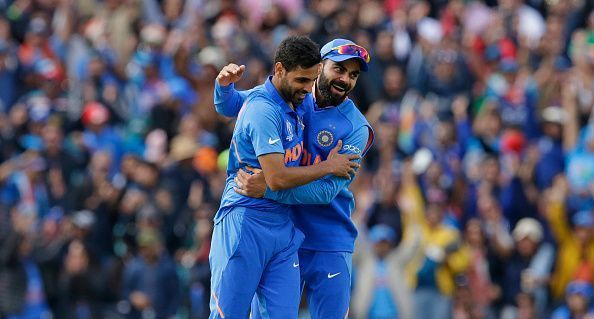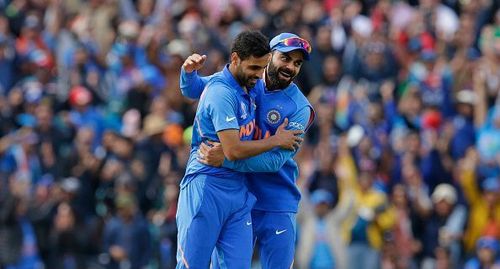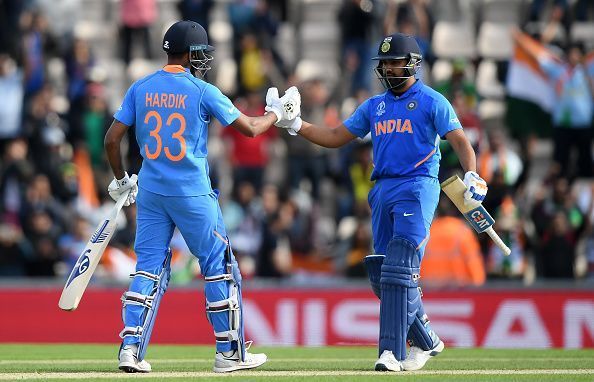
World Cup 2019: The turning point in India vs. Australia

The highly anticipated clash between India and Australia was one of the marquee features in the round-robin phase of the World Cup. Before the match began, there were plenty of questions yet to be answered. Would India's batting line-up fire given the exertions of the IPL? Would the spin twins Yuzvendra Chahal and Kuldeep Yadav deliver? Would the Aussie big guns Steve Smith and David Warner shake off the rustiness of a year-long ban? Perhaps most important, would the Aussie pace battery blow the Indian batsmen out of the water?
In the end, India ran out worthy winners in their high-octane clash. A fabulous opening stand between Rohit Sharma and Shikhar Dhawan provided the ideal platform for the heroics of Virat Kohli. Given Shikhar's formidable score (117), it is easy to overlook Rohit's role in blunting the pace threat, which he did with style and confidence. Hardik Pandya and MS Dhoni provided the fireworks towards the business end as India closed on a mammoth total of 352/5. This was the highest score that Australia was required to chase in any edition of the World Cup.
In reply, Australia never got going with any degree of fluency. Warner, Smith and Glenn Maxwell all got starts, but could not convert them to a big score. Indian fans would have been wary of the big hitting abilities of Marcus Stonis, Nathan Coulter-Nile and Alex Carey. Australia's deep batting line-up ensured that they were never out of the game. Despite some spectacular hitting towards the end by Carey, they were bundled out for 316, thus handing India a morale-boosting victory.
The Turning Point:
So, what was the tipping point in this contest? There will be as many answers to this question as there are cricket pundits. Some will point to the opening century partnership that dented the Aussies pace bowlers’ morale. Others will refer to Kohli's 82 which was the fulcrum around which India's batting revolved. Admirers of Hardik will argue that his brutal assault on the Aussie bowlers swung the game India's way.

Moving over to the bowling department, a potent case could be made out for Bhuvi's twin strike in the 40th over, that accounted for a well-set Smith and a big-hitter Stonis departing. Equally important was the stranglehold exercised by the spinners, who dried up the runs during the middle overs just when the Aussies needed to up their tempo.
For me, the game-changer was the seventh ball of the Australian innings, bowled by Bumrah to Warner. It took off from a length like a spitting cobra. A startled Warner tried desperately to control his shot, only to see the ball ricochet off the inside edge on to his stumps. The fact that the bails did not budge saved Warner, but the damage done to the psyche of the Aussie batsmen was incalculable. Their mojo was gone, and the more frantically they sought to recover it, the further it receded.
Indeed, it may well be argued that the recalcitrant bails did India a good turn. For Warner consumed a good 84 balls for his 56, and in doing so, infected the rest of the team with his sense of uncertainty and unease. Chasing a humungous target of 352 required, it was imperative for the Aussie openers to fire with their usual panache and take the game by the scruff of its neck. Aussie batsmen are known for their swagger, for bossing it over hapless bowlers while calling the shots. Cricket is in essence a mind game, and here the famed mental strength and grit of the Aussies disintegrated.
Sometimes, a stroke of bad luck turns out to be a harbinger of good Fortune!
Also read - World cup winners captains list
Follow Sportskeeda for all the updates on World cup points table, news, live scores, World Cup schedule, most runs, most wickets and fantasy tips.